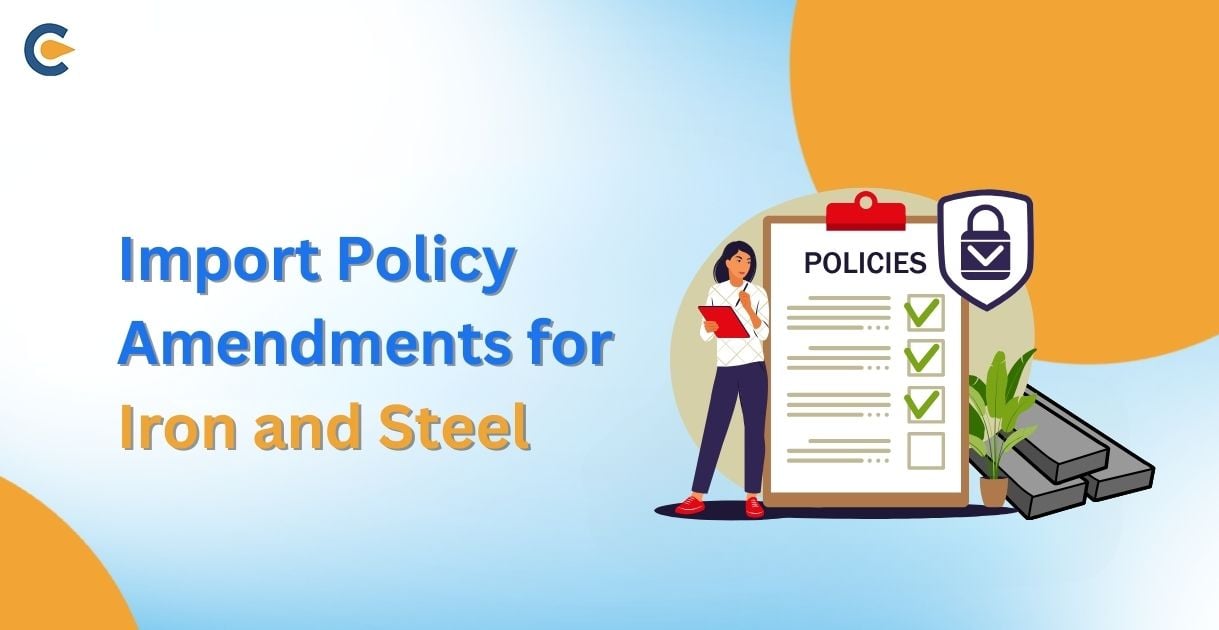A government’s set of guidelines, rules, and regulations for regulating the importation of products and services from other nations is known as its import policy. The goals of import policies are to safeguard home industries, control foreign commerce, maintain national security, and increase income through taxes and levies. Good import regulations can protect domestic manufacturers, advance industrial development, boost economic expansion and guarantee consumer protection. Excessively stringent import regulations, however, may result in trade conflicts, increased consumer costs, and restricted access to outside markets.
Importance of Import Policies in Shaping the Industries
The latest import policy is very important for shaping industries. The regular import policy amendments for iron and steel help shape the country’s industries. Import regulations are essential in forming industries at the national and international levels. Governments enact these laws to control the movement of products and services across national boundaries. These laws affect a number of industry factors, including employment, innovation, competitiveness, and economic growth.
Import regulations have a significant impact on the performance and structure of industries, which in turn drives economic growth. Import-related trade balances, investment trends, job levels, and national prosperity can all be impacted by strategic import policy decisions. Import policies that are in line with national interests and goals can help governments promote resilient industries and strengthen the economy.
Goals of Import Policy Amendments for Iron and Steel
There are various goals that were kept in mind at the time of import policy amendments for iron and steel. Some of the goals of import policy amendments for iron and steel are:
1. Job Creation and Preservation:
One of the key goals for import policy amendments for iron and steel is creating employment. Promoting the nation’s Iron and steel sectors through import laws is related to the objective of generating new job possibilities and protecting current employment. Governments may try to keep their work force competent and stop foreign competition from taking away jobs.
2. Technological Advancement:
Technology holds a very vital place in the current era. Technological advancement is important at the time of import policy amendments for iron and steel. It is possible to design import regulations to promote the domestic iron and steel sector’s adoption of cutting-edge technology. This might entail offering rewards for R&D projects, technological transfer, and the adoption of cutting-edge procedures.
3. Encouraging Domestic Industry:
To safeguard and encourage their own domestic iron and steel industry, governments may enact import regulations. To do this, trade obstacles such as tariffs and quotas are imposed in order to reduce the competitiveness of imported goods in relation to domestically produced ones. Import policy amendments for iron and steel help in promoting domestic industry.
4. Market Stability:
Amendments to import regulations can be intended to preserve the stability of the domestic iron and steel industry. Governments can avoid excessive price swings, guarantee a consistent supply of necessary resources, and protect the interests of local manufacturers by controlling the entry of foreign items. With import policy amendments for iron and steel, the country can achieve market stability.
5. Quality Requirements and Environmental Concerns:
With import policy amendments for iron and steel, many environmental concerns and requirements for quality are ensured with changing times. To guarantee that imported steel and iron satisfy the necessary safety and environmental requirements, import policy modifications may include quality standards and environmental restrictions. This is necessary to preserve fair competition with domestic manufacturers while safeguarding consumers and the environment.
6. International Relations and Trade Agreements:
Changes to import policies can be in line with a nation’s obligations under international trade agreements. Import policy may be impacted by trade negotiations in order to promote more seamless trade connections while defending national interests. Import policy amendments for iron and steel are often used to establish trade relations.
Key Points of Import Policy Amendments for Iron and Steel
Some of the key points of import policy amendments for iron and steel are:
- In order to import the commodities on the list, importers will need to submit advance information to the Steel Import Monitoring System via an online system.
- After paying a certain price, they will get an automated registration number.
- Stranded wire, ropes, cables, some flat-rolled goods, leaves for iron and steel tube springs, diesel-electric locomotives, pipelines, hollow profiles, and other railroad components are among these things.
- Under the Import Policy for Iron and Steel, the government has mandated that merchants register with the Steel Import Monitoring System (SIMS) in order to import a list of iron and steel items, as detailed in the section that follows.
- The Policy Requirement for ITC (HS) Chapters 72, 73, and 86: The products’ import policy has been changed from “free” to “free subject to mandatory registration.”
- In order to import products included in the Annex, importers must first provide prior information using an online system in order to receive an automated Registration Number.
- Depending on the CIF value of the relevant imports, a registration fee of Rs. 1 per thousand, with a minimum of Rs. 500 and a maximum of Rs. 1 lakh, must be paid.
- The importer may submit an application for registration no sooner than sixty days before the anticipated arrival date of the import consignment, nor later than fifteen days prior.
- The issued Registration Number is only good for a full seventy-five days.
- In order to clear the cargo, the importer must include the registration number and the registration’s expiration date in the relevant Bill of Entry.
- The Bill of Entry for the products mentioned in the Annex on or after November 1, 2019, will be subject to the SIMS and will be controlled by it. The SIMS will take effect on that date.
- As of September 16, 2019, the online registration feature will be accessible.
Steel Monitoring System Registration in India
Steel Import Monitoring System is referred to as SIMS. The Indian Ministry of Commerce and Industry created this digital platform with the goal of efficiently monitoring and controlling the import of steel goods into India. Prior to shipping goods to India, importers are required by SIMS to register their import-related steel information in an online database.
Conclusion
When all is said and done, these import policy amendments or iron and steel demonstrate a commitment to aligning the iron and steel sector with broader national economic goals, promoting innovation, generating employment, and reducing dependency on external resources. With Corpbiz, you can ensure a hassle-free SIMS registration under the guidance of experts with decades of experience.
Frequently Asked Questions
Does India import iron and steel?
Yes, India imports iron and steel on a very large level.
What is the import policy of India?
The rules controlling the import and export of goods and services into and out of India are outlined in the EXIM Policy. The main goal of the EXIM Policy is to facilitate imports into and exports from India in order to regulate and expand international commerce.
What is SIMS?
The Ministry of Commerce and Industry of the Government of India established the Steel Importing Monitoring System (SIMS) to notify important stakeholders and the government in advance regarding steel imports.
Who must create an account on the SIMS portal?
All importers, dealers, and manufacturers engaged in steel import operations in India are required to register on the SIMS platform.
Which import policy adjustment affects particular iron and steel goods the most?
The policy is now “free subject to compulsory registration under the Steel Import Management System” (SIMS) instead of “free” as a result of the revision.
What number of products subject to customs tariffs is the Annex to the Amendment Notification covering?
There are 284 customs tariff items in the Annex that must be registered in accordance with SIMS.
What is the SIMS registration cost for importers?
A registration charge of one rupee per thousand, with a minimum of five hundred rupees and a maximum of one lakh rupees on the CIF value, must be paid by importers.
When is it possible for importers to apply for SIMS registration?
Application for registration must be made no earlier than 60 days in advance of the anticipated arrival of the import consignment and no later than 15 days in advance.
How long is the validity of the Registration Number issued under SIMS?
The Registration Number is good for a full seventy-five days.
Who amends the import policy?
The DGFT (Directorate General of Foreign Trade) amends the import policy.
Read Our Article: Import Policy Amendments for Iron and Steel










